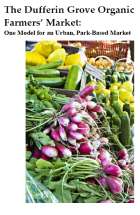
Pages in this Folder:

Related Folders:
See also Department Site Map
Publications:
Market-related videos
Comments?
For the basics, see
- Website & Privacy Policies
- How To Get Involved
- The Role of the Park
Search options:
Department Site Map
Custodians:
< Slow Food Fundraiser 2006 | Notes Library | July 13-2006 >
Weekly Market Notes for June 29 and July 6, 2006
Hello Market Friends:
School's out! Time to enjoy beautiful summer evenings in the park. There's a great selection of choices for dinner at the market so you can linger a little longer after you get your groceries. Roti, crepes, salads, pizza, burgers, and veggie sushi are just some of the possibilities. We'll be wrapping up our market survey this week, so don't forget to hand one in if you haven't yet, and you'll have a chance to win a basket of market goodies. So far, one of the things that really stands out in the responses is just how much people value eating local. And local just keeps getting better these days! Here's the news:
From Jessie Sosnicki:
This is what Ben will be bringing to market: our broccoli field is looking great! Available tomorrow will be an abundance of large heads of broccoli. Also LOTS of peas-in-the-pod! Ben's mother took pride in weeding the entire patch, while Ben and I were busy with lettuce harvest. Of course lots of green leaf, red leaf and romaine lettuces still, at least for the next couple of weeks. Also lots of red bunching onions as well. We've done things a bit differently this year, so our carrots and beets will be a while yet. Our large carrot harvest will be more fall-geared this year, along with the beets. Tomato patch is looking great. Lots of romas and heirlooms (later)this year! Sweet corn is up and looking great, same with potatoes. We've irrigated once so far and weeding never stops!
From Jonathan Forbes:
"I'll be at the market Thursday with maple syrup in 3 sizes, dried mushrooms, wild fruits and wild veggies. I'll also have a one time special of Jellied Rose Petals, $6.00 instead of the usual $9.00."
Deer Valley Farm will have a variety of fresh (aged) venison available this week. Venison burgers will be available hot off the grill for those who are hungry while shopping. We always have Elk Velvet Antler capsules and Emu Oil available at the market as well. Any special requests can be made to: order@venison.ca
From Colette Murphy:
This market will be the last one of the season for Urban Harvest so all plants are on a 50% off sale. Try planting some peppers and eggplants in pots and it is still a great time to plant the native Ontario plants. Earthly Paradise Botanicals will be back next week with all our lotions and potions.
Early birds at last week's market didn't pay much attention to the plain white box freezer sitting beside the rinkhouse, but once the Kensington Market Organic Ice Cream sign went up, lots of people had to find out what was inside, and the single servings sold out fast. This week, there will be more of those, so that later shoppers still have a chance.
For Friday Night Supper -- this time we have a guest cook, Yvonne Maceda, who will be coming to the market to help shop for a special Portuguese meal, accompanying the Portuguese Film Festival's outdoor screening of a feature-length film at the park later that night.
Next week, I will be away, and so will my friendly replacement news editor, Jutta, so we've decided to have a market news "siesta". Don't worry, the market will be in full swing as usual, of course.
See you there!
Anne
posted June 29, 2006
Genetically Engineered Plum Campaign
Here is a message sent to us by former Greenfields employee Tarrah Young, on the subject of genetically modified plum trees. It explains some of the issues, and calls for help lobbying to stop the approval of these trees for commercial cultivation in the US.
Please read this and do something about it! There is a fair bit of information below, and no easy petition to add your name to here, but there is a link to to a US government website where you can submit your comments, or just paste the points listed. It won't take too long, and the deadline of July 17 will be upon us in no time. Please spread the word and have your say.
Tarrah
GE plum alert: Stop release of 1st temperate GE tree (plum)
23.jun.06
STOP Genetically Engineered Trees Campaign
www.stopgetrees.org
Please forward widely!
Alert: Stop the commercial planting of genetically engineered plums-the first temperate GE tree (Please follow the directions at the bottom of this email to inform the USDA of your opposition to GE plum trees before July 17th. ) The US Department of Agriculture is accepting public comments between now and July 17, 2006 on a petition that would allow commercial growing and marketing of the first genetically engineered (GE) plum trees. If approved, this would remove all regulatory oversight of this GE variety, a virus-resistant plum tree known as the Honey Sweet Pox Potyvirus Resistant plum. This would open the door to GE varieties of many other related stone fruits, such as peaches, apricots, cherries and almonds, that are susceptible to the same virus. Ironically, this virus is not even found in the US today according to the USDA, and is certainly not a significant agricultural problem here.
The USDA admits that this GE plum will contaminate both organic and conventional non-genetically engineered plum orchards if it is approved. Since all commercial plum trees are cultivars that are relatively cross compatible within the same species, Prunus domestica, contamination via GE plum pollen carried by bees and other insects will infiltrate the plum orchards of organic and conventional growers. The proposed buffer zones between GE plums and other plums will not prevent genetic contamination from being spread by pollinating insects.
Because this GE plum tree is also the first genetically engineered temperate tree proposed for commercial planting, it also opens the door to the commercialization of GE varieties of other temperate trees such as poplars, pines, and walnuts.
The one GE fruit tree that has previously been approved, a virus resistant Hawaiian papaya, has caused extensive contamination of organic, conventional and wild papaya orchards on most of the Hawaiian Islands in just a few years. This contamination has spread far more quickly than the USDA predicted in its initial assessment. Once native and cultivated plum varieties are contaminated with transgenic pollen, there is no calling it back.
This petition has implications for all other GE tree species, as the USDA and the industry want to gauge what the public's reaction will be. It is critical that all concerned about the threat of GE foods and GE trees respond to this USDA petition.
[Comments to submit below. Please add any additional comments of your own.] The following comments are in reference to Docket No. APHIS-2006-0084 I oppose the deregulation of genetically engineered plum trees for the following reasons:
1. Genetic contamination is a serious threat. Flowers and fruit in organic and conventional plum orchards will become contaminated with GE plum genes via pollen transported by bees and other insects that travel many miles in search of pollen. The result is that organic and conventional plum growers will lose their markets for non-GE plums as DNA testing confirms the contamination, as it has with GE papayas in Hawaii. An organic tree might remain organic itself, but the fruit and seeds will become contaminated. 2. The approval of GE plums would be a precedent setting step by USDA, opening the floodgates for more GE trees including fruit, nut, ornamental, and paper-pulp species, as well as trees engineered for soil remediation, and other traits. Approximately 80 species and varieties of trees are currently undergoing gene splicing research and development for commercial use.
3. There is a serious concern about the genetic stability of the inserted genes in GE plum trees. USDA claims that the plum pox viral resistance gene and other inserted genes are sufficiently genetically stable, but the testing has only been performed over ten years and not the entire pollen-producing life span of a plum tree. Over the life of a tree, an RNA virus such as plum pox is susceptible to many cycles of recombination, leading to the creation of new plant viruses that could infect a wide variety of plants. This can also occur with the viral DNA that has been inserted into these plums.
4. The plum pox virus is not currently known to exist in the US as a problem for plum growers. Thus there is no justification for exposing other trees, plants, insects and people to the various hazards posed by GE plums.
5. The deregulatory petition completely ignores potential effects on bees and other pollinator species. There are no studies that would allow us to evaluate the potential hazards of GE tree pollen for a variety of insects, or for consumers of honey. We also do not know how animals and insects that browse on plum leaves might be affected.
6. The USDA's environmental assessment admits that the GE plum readily hybridizes within its species. Thus, there is a significant potential for gene flow into native plum varieties. Wild plum trees are perennial species living for several decades and populations exist in dozens of states from coast to coast. GE plum trees will be long lived, and capable of contaminating orchards and native plum tree populations for several decades. One GE plum tree will be able to produce thousands of GE seeds and extensive quantities of GE pollen, and will be capable of spreading fertile GE plum seeds and pollen into the environment for many years. The petition did not adequately evaluate the relative fitness of GE plum varieties as compared to native plums; it is possible that the GE varieties would become more successful in natural settings, and out-compete non-GE varieties. We challenge the USDA spurious claim that contamination would be positive by reducing potential reservoirs for harboring the plum pox virus in the wild. 7. There has been no short-term or long-term safety testing or feeding trials for toxicity and other adverse effects of the genes inserted into the GE plum trees. GE plums have not been tested on animals, birds or humans for safety. Toxicity tests are necessary since unintended genetic effects are known to occur with gene splicing. USDA has ignored the need for scientific studies of gene splicing and for comprehensive studies of the environmental consequences of GE plantings.
The US Department of Agriculture is accepting public comments between now and July 17, 2006 on the petition to formally deregulate and allow commercial growing and marketing of GE plums. To submit your comments, send an original and three copies with your name and address to Docket No. APHIS-2006-0084, Regulatory Analysis and Development, PPD, APHIS, Station 3A-03.8, 4700 River Road, Unit 118, Riverdale, MD 20737-1238. If you wish to submit a comment using the Internet, go to www.regulations.gov. In the "Agency" box, select "Animal and Plant Health Inspection Service" from the drop-down menu; select "NOTICES" as the Document Type and APHIS-2006-0084 as the "Keyword or ID." Then press "submit" to submit or view public comments as well as the agency's supporting materials; click just beneath "Add Comments" and scroll down to submit your letter. Feel free to copy and paste any or all of the 7 points above, along with any comments of your own. Please forward this widely among your friends and other contacts.
Thanks for helping us STOP the genetic engineering of trees!





 Printer friendly version
Printer friendly version